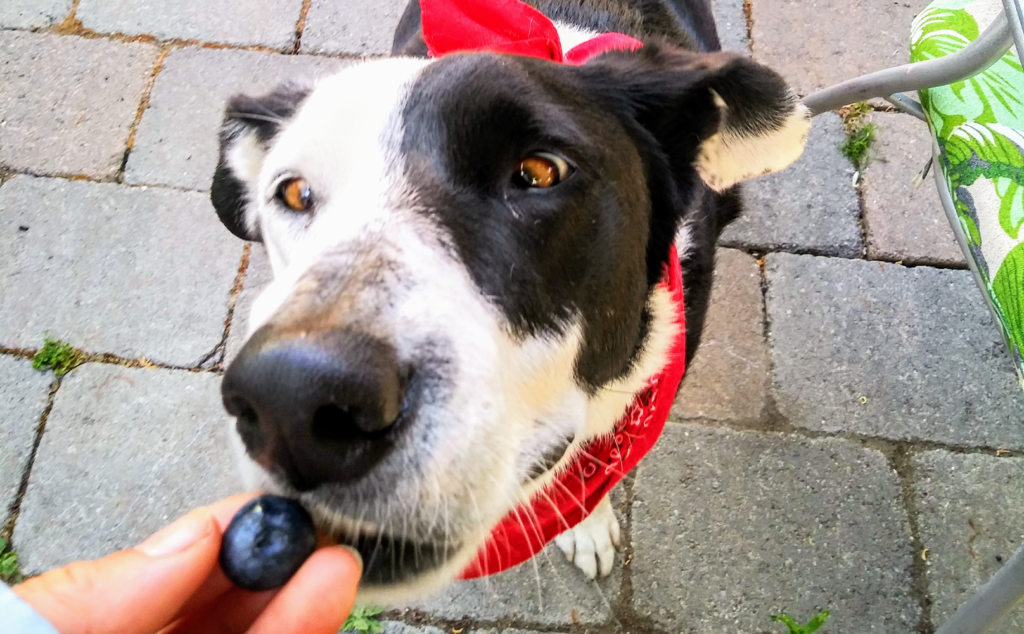For Pups With Short Attention Spans…
Being one of the most popular and delicious berries, many wonder, can dogs eat blueberries? In short, yes, dogs can eat blueberries. Blueberries are a healthy low calorie snack for dogs and are packed with antioxidants. Try freezing blueberries and plain yogurt together for a long lasting treat for your pup.
It’s common for dogs to want to eat practically everything in sight—kibble, treats, your dinner, you name it. But there are some things they should stay away from, too. Most people know about the dangers of a dog eating a pound of chocolate, but what about other common foods, like blueberries?
Can Dogs Eat Blueberries?
Yes, absolutely, 100%!
Unlike other fruits that are toxic to dogs (stay away from grapes and cherries), blueberries are not just okay for dogs to eat, they’re actually a healthy snack! If you’re lucky enough to have a pooch who goes bananas for fruits and vegetables, enjoy tossing a few blueberries in their dog food every now and then. Maybe they’ll even join you picking some fresh blueberries!


Blueberry Health Benefits
Blueberries are a low-calorie treat filled with vitamins and nutrients. They’re packed with vitamin C and vitamin K, as well as fiber, which are all seriously beneficial to a dog’s health. They also boast high levels of antioxidants. Studies show that blueberries fight free radicals in the air, and that antioxidants may help a dog’s health by reducing the consequences of cell damage and brain aging, which can make it an especially healthy snack for any senior dog1.
You can use blueberries as training treats, pop a few into their kibble, or mash them up and mix with their regular meal.
Just Don’t Overdo It
Before you let your dog inhale an entire container of blueberries, remember that moderation is always key. A dog’s diet shouldn’t be primarily made up of treats (only about 10%), even if they’re natural and healthy like blueberries.
While humans can enjoy baked blueberry treats, it’s important to remember that these items may have added sugar and other ingredients that aren’t healthy for a dog’s diet. It’s no big deal if they find your crumbs as an occasional treat, but be cautious of feeding your pup:
- Blueberry muffins
- Blueberry pie
- Blueberry pancakes
In addition, you should avoid letting your dog eat any wild blueberries, as they could end up being a different type of berry. If you’re looking to feed your dogs blueberries, it’s best to choose a fresh or frozen batch from your supermarket or local fruit stand.
They may also give your dog digestive issues when consumed in excess, especially if blueberries are a new food for them.


Anything Else I Should Know About Blueberries?
Depending on where you live, blueberries can be a little pricey. Go ahead and freeze some when you’re able to grab a carton in season. They freeze and thaw easily, which means you can stock up when they’re on sale. (Frozen blueberries are a nice dog treat in summer!)
Aside from feeding your dog blueberries, feel free to experiment to find other fruits they may enjoy as a treat. Do your research before you pass your pup something from your fruit salad, of course, but it’s nice for dogs to experience something new every once in a while – that dog food gets boring! Some other berries you can alternate into your dog’s diet include:
- Strawberries
- Blackberries
- Raspberries
- Cranberries
If you’re like us, you’re probably also wondering: can dogs eat apples?
Sources
1Cotman, C., Head, E., Muggenburg, B., Zicker, S., & Milgram, N. (2002). Brain aging in the canine: A Diet enriched in antioxidants reduces cognitive dysfunction. Neurobiology of Aging, 23(5), 809–818. https://doi.org/10.1016/s0197-4580(02)00073-8







